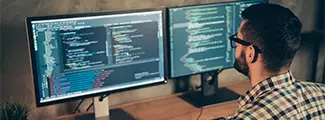The job industry in India is highly competitive, with a teeming pool of qualified candidates eyeing the position you plan to apply for. Today, it takes more than just studying hundreds of LeetCode questions to crack a software engineer interview. It is not enough that you possess the necessary skill set, but it’s important that you communicate and present yourself in a manner that appeals to your potential employer during the interview process.
Software engineering tasks are broadly classified into broad programming and field-specific. An interviewer assesses your coding acumen, technical skills, and problem-solving skills that apply to both classifications.
Recruiters frequently inquire about a wide range of topics, spanning technical to behavioural aspects, for software development roles that encompass all-inclusive responsibilities. The development process may diverge significantly in certain instances, prompting recruiters to tailor their questions accordingly.
This blog is a playbook of tips and strategies that will come in handy if you are planning to apply for software engineer job openings in India.
Recognise the Job Requirements
Every software engineering role demands a specific skill set. For instance, IT service management companies like HGS prefer software professionals who have a sound knowledge about the OOPS concept and AJAX. You must understand the requirements to tailor your preparation accordingly. Tailoring your trial increases your efficiency and effectiveness, as you can concentrate on relevant areas to the position.
A proper understanding of the job description helps you showcase relevant projects, accomplishments and technical achievements that match your recruiter's needs. By drawing parallels between your experiences and the job requirements, you demonstrate your ability to meet the company's needs and provide value to their team.
Familiarity with the job requirements empowers you to field thoughtful and relevant queries. Asking about the team's technical stack, potential projects, or how the company handles specific software development challenges demonstrates your genuine interest and commitment to the role. Engaging the interviewers with pertinent questions leaves a lasting impression and maximises your chances of getting shortlisted.
Review Key Concepts
Having a firm grasp of critical software engineering concepts is half the job done. Remember that your recruiters are seasoned professionals who cannot be convinced by rote memorisation but by an in-depth understanding of all the fundamentals. It is one of the software engineer skills must-haves.
A more profound comprehension of all the engineering fundamentals empowers you to think critically and develop problem-solving skills. You will likely encounter various challenges in interviews, from algorithmic puzzles to system design scenarios. When you understand the underlying principles, you can break down problems into manageable components, apply the appropriate techniques and arrive at practical solutions.
Coding Exercises
 Problem-solving is at the heart of software engineering and is what employers value most. Coding exercises are tangible ways to demonstrate this skill before recruiters.
Problem-solving is at the heart of software engineering and is what employers value most. Coding exercises are tangible ways to demonstrate this skill before recruiters.
The practices are designed to simulate real-world scenarios that software engineers face daily. These problems range from simple algorithmic puzzles to complex system design challenges. Engaging in these exercises enables candidates to demonstrate their analytical thinking, creativity and ability to devise efficient solutions.
During the process, recruiters test the correctness of your code and your approach towards it, which is crucial for a successful career in software engineering.
Study System Design
In software engineering, system design involves designing scalable, efficient and reliable solutions to complex problems. It encompasses designing various software systems, such as web applications, distributed systems, databases, etc. Studying system design equips you with the knowledge to optimise and make systems functional, which is crucial in modern tech environments.
You must articulate your design decisions during software engineer interviews and communicate effectively with interviewers. It is a skill held in high regard in a team setting, where engineers collaborate to build large-scale systems.
Analyse the Company and the Technology Stack
The importance of knowing about your recruiter and the kind of technology they work with or build cannot be overstated. A proper understanding of the same gives you the scope to prepare for the interview accordingly.
Familiarising yourself with a company's tech stack demonstrates your genuine interest in the organisation, sending a positive message to the hiring team. It proves your preparedness to operate within their tech ecosystem, development methodologies, and the unique challenges they face.
Behavioural Skills
Chances are slim that you get to work solo on a software project after being hired by a company. Mostly, you either lead a team or be a part of it. It makes behaviour one of the crucial skills of a software engineer.
Companies look for candidates who can effectively communicate, listen and contribute constructively to a team. Experienced candidates must provide practical examples of how they collaborated effectively on projects, resolved conflicts, or supported teammates in achieving their objectives.
Beginners must exhibit emotional intelligence by being attentive, respectful and empathetic. Talk about handling pressure, resolving conflicts and maintaining a positive outlook in challenging situations.
Mock Interviews
Interviews in the tech industry can be very dynamic. You may find yourself answering the usual questions with a sudden curveball question thrown in, such as "Would you challenge yourself and take up a project that is beyond your expertise or stick to your comfort zone"?
Even the most experienced candidates falter in answering such questions. The possibility of such situations reinstates the importance of mock interviews.
Participate in online coding assessments to solve simple to complex algorithm questions in real time. Mock practices simulate a real interview scenario where you get accustomed to the interview pattern that reduces your anxiety.
Research Code Repositories
Code repositories, often hosted on platforms like GitHub, GitLab, or Bitbucket, are virtual treasure troves of source code. They store projects, codebases and software components from millions of developers worldwide.
Researching code repositories helps you understand the approach experienced developers take to solve problems, conduct complexity analysis, implement design patterns and tackle common challenges. The learning experience can be invaluable during technical interviews.
Stay Up to Date
 The technology industry has been characteristically dynamic. Today’s innovation is redundant tomorrow. Such dynamism makes it extremely important for aspiring engineers to stay on top of industry trends.
The technology industry has been characteristically dynamic. Today’s innovation is redundant tomorrow. Such dynamism makes it extremely important for aspiring engineers to stay on top of industry trends.
Besides staying updated, candidates must have hands-on experience with the latest tools to demonstrate their adaptability and willingness to learn, setting them apart from other applicants.
Raise Questions
 The technology industry is no place for cookie-cutter theories or practices. It is the playground for those who believe in innovation and creativity that is manifested by curiosity. This is one of the vital software engineering skills on which you will be tested in the most surprising ways during an interview.
The technology industry is no place for cookie-cutter theories or practices. It is the playground for those who believe in innovation and creativity that is manifested by curiosity. This is one of the vital software engineering skills on which you will be tested in the most surprising ways during an interview.
Your recruiter may suggest a wrong or dated code refactoring technique. Raise questions about the rationale behind the suggestion and offer an alternative backed by a plausible explanation from your side.
Ask questions about your recruiter's portfolio, technology, and utilisation in the real world. It is an inherent skill that will help you to pursue a software engineer career.
Time Management
A software project can be highly demanding. You may experience situations where you are expected to deliver the upcoming sprint before the deadline. The possibilities of such scenarios are high, so time management becomes an essential software engineering skill.
Effective time management is closely tied to problem-solving skills. You'll encounter challenging coding questions requiring efficiency and accuracy during a software engineering interview.
Focus on improving your technical problem-solving abilities, practice solving coding challenges within time limits and optimise your approach for speed and correctness.
Examine Your Resume
Got all the required skills and experience yet not getting shortlisted? Your resume can be a problem.
Review your resume to see whether it effectively highlights the fundamental programming languages, frameworks, tools, and technologies in which you are proficient. Emphasise projects you have worked on and demonstrate your problem-solving abilities. Quantify your achievements with concrete data whenever possible to showcase your impact in previous roles.
The same resume may not suit the liking of all recruiters. Some may want to focus on your debugging skills, while others prioritise your skills in solving data structure problems. It warrants the necessity of tweaking your CV accordingly to set the first impression right.
Maintain Your Calm and Confidence
 The technical challenges, whiteboard coding, and pressure to impress potential employers can create stress, dampening your confidence. A lack of confidence is often responsible for candidates committing rookie mistakes.
The technical challenges, whiteboard coding, and pressure to impress potential employers can create stress, dampening your confidence. A lack of confidence is often responsible for candidates committing rookie mistakes.
Software engineering interviews often involve complex problem-solving tasks that require a systematic approach. When calm, you can better break down the problem, identify the core issues and devise a structured solution.
Practice mindfulness techniques such as deep breathing and visualisation to reduce stress and promote a sense of calm before and during the interview.
Following Up
Following up is one of the most underestimated aspects of the job search process. After an interview, a thank-you email or note is an excellent way to reaffirm your interest in the position and the company.
In the software engineering industry, professionalism is highly valued. Following up after an interview is a professional courtesy that showcases your etiquette and communication skills. It reflects your ability to handle yourself appropriately in a business setting, an essential trait for any software engineering role.
Conclusion
Software engineer job demand continues to soar. You must brush up your technical prowess, problem-solving abilities and effective communication skills to set you apart from competitors.
You must remember that interviews are not just about getting the correct answer but also about demonstrating your problem-solving approach, adaptability and ability to work well in a team. You can significantly increase your chances of success by mastering the fundamentals, practicing coding challenges, and staying calm under pressure.
 India
India Canada
Canada Colombia
Colombia Jamaica
Jamaica Philippines
Philippines UK
UK US
US SA
SA



